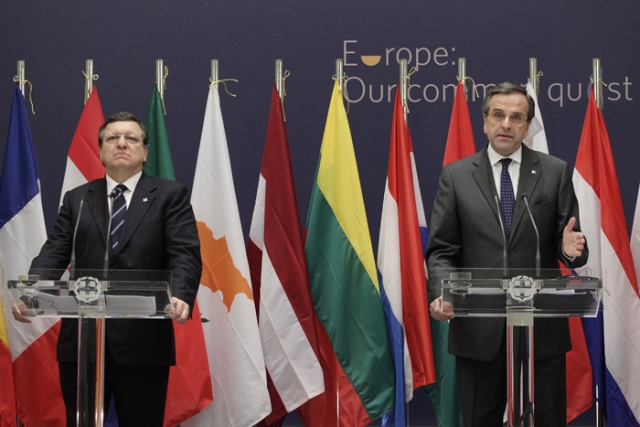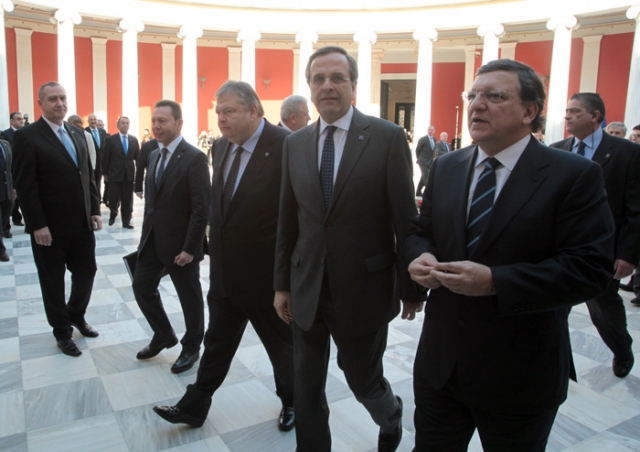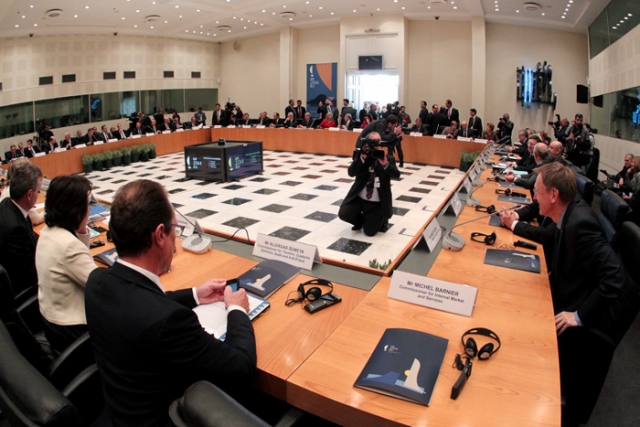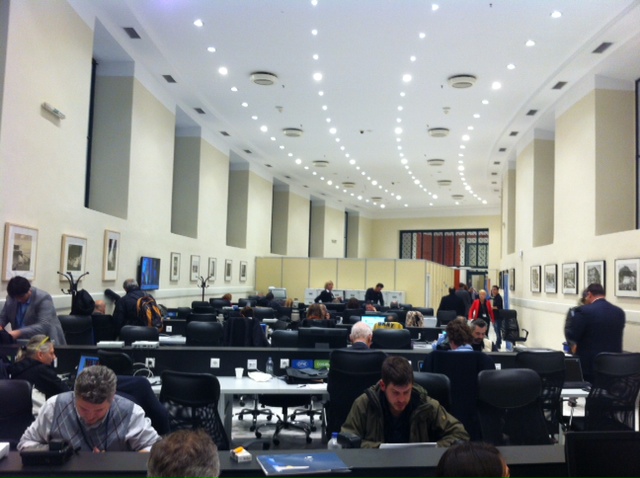Photo: gr2014.eu and the author
Anastasia Balezdrova
The leader of the main opposition SYRIZA party, Alexis Tsipras, was the first who clearly would not attend the ceremony for the assumption of the EU Presidency by Greece. The European Left candidate for President of the European Commission boycotted the ceremony in protest against the postponement of the current visit of two Members of the European Parliament (MEP), inspectors of the supervisory Troika, to Athens. "Instead of taking advantage of the investigation of the actions of the Troika carried out by the European Parliament, the Prime Minister and the cabinet are trying to bury it with celebrations on the occasion of the memorandum", reads the statement of SYRIZA.
It became clear a little later that the leader of Independent Greeks, Panos Kamenos, would not attend the ceremony either. The party press office reported that he was about to leave for the United Kingdom to meet with nationalist MEP Nigel Farage. The message of the party was equally negative towards the European institutions, "The bureaucrats in Brussels headed by Mr. Barroso came to Athens and saw empty streets because the Troika’s government had banned the Greeks from protesting and demonstrating their exhaustion which is due to the politics of the money lenders."
Although deputy Dimitris Hadzisokratis will still represent the party, the leader of the former third partner in the government coalition, Fotis Kouvelis, was also absent from the official launch of Greece’s EU Presidency. The concise explanation presented by the Democratic Left party was that he was outside Athens for other purposes.
The Greek Communist Party, on its part, has opposed Europe for years, although it willingly participates in the European elections and nominates MEPs. In the case of Golden Dawn, the matter is rather technical as its leader Nikos Michaloliakos is in prison.
Greek Prime Minister Antonis Samaras harshly commented on Alexis Tsipras’ decision to boycott the launch of Greece’s EU Presidency. During the joint press conference with European Commission President Jose Manuel Barroso he called his main political opponent "this particular person" and accused SYRIZA of anti-Europeanism and negativity towards the West and NATO.

"Greece is politically stable. The government is stable and is hoping that the next parliamentary elections will be held in 2016," Samaras said, adding that the Greeks’ vote in the upcoming European elections will determine their choice, namely "whether they want to be in Europe or not." He did not exclude the probability of the vote being an expression of dissatisfaction thus making it clear that anger would be the only reason for the people to support SYRIZA.
The European Commission President said in turn that the political stability affects the economy and its absence "affects the confidence of investors and markets." Therefore, he clearly appealed that "The responsible political forces should act responsibly," without naming the sides concerned.
Jose Manuel Barroso said several times that the programmes for the recovery of the weaker economies in the euro zone had had results where they had been applied correctly. According to sources who attended the discussions during the joint meeting of the College of Commissioners with the Greek cabinet, the message to Athens was the example of Ireland, which has successfully completed its programme and returned on the international financial markets.
"Sustain your efforts," was his message to the Greeks whereas his recommendation was that the government should accelerate the public administration reform and the privatisation. "There are still clouds on the horizon," Barroso said, adding that the Greek programme has proved to be the most problematic for political reasons. He however expressed belief that 2014 will be the year when the country will emerge from the recession.

Greece and its problems dominated during the press conference at the beginning of which Antonis Samaras presented the priorities of the country in connection with the EU Presidency without mentioning specific projects or plans.
On the day of the official start of Greece’s six-month EU Presidency, which is the fifth for the country, no contacts between the commissioners and the media on issues that affect all member states were scheduled.

However, according to the staff of the press centre of the Presidency, about 100 foreign journalists had been accredited for the ceremony, which is a small number for an event of this scale.

The assumption of the EU Presidency ended with an official ceremony and concert at the Athens Concert Hall attended by Greek President Karolos Papoulias, President of the European Council Herman Van Rompuy, the President and all members of the European Commission, the Greek cabinet, representatives of different fields and Ecumenical Patriarch Bartholomew.